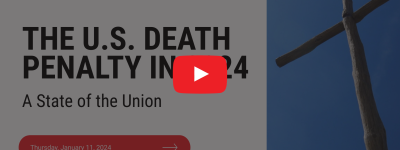
Dozens of young adults ages 18-30 from all across the country entered poems in Catholic Mobilizing Network’s 2024 Justice & Mercy Poetry Contest.
The third-annual contest invited young people of faith to write about the injustice of the death penalty through the creative outlet of poetry. Poets chose to reflect on the contest’s themes by highlighting the racial injustice of capital punishment, the risk of executing innocent people, and the call to honor the sanctity of life — even the lives of those on death row.
This year’s winning poems were selected by a diverse and discerning panel of judges including the sister of a death row exoneree, a young Catholic journalist, a lawyer, a poet who was formerly incarcerated, and a previous winner of CMN’s Justice & Mercy Poetry Contest.
The following four individuals have been selected as finalists in this year’s contest for their outstanding poems:
First Place, “Christ to the Condemned” by Katie Painter
Second Place, “BUT FOR THE GRACE OF A WHITE GOD” by Morgan Miles
Third Place, “Miles Long” by Krystia Ramirez
Honorable Mention, “The Little Flower” by Allison Ramirez
Each poem offers a unique perspective into how cruel, inhumane, and unjust the system of capital punishment is.
“The Little Flower,” tells the story of a woman’s encounter with a priest ministering to her during her final days on death row. The priest shares with the narrator the legacy of St. Thérèse of Lisieux, who prayed for a man’s conversion before his execution.
“Ask her to pray for you,” he says.
“Miles Long” tells the story of an encounter as well. This time a child, visiting their father on death row. The gripping poem captures the pain that family members suffer in the years-long struggle through appeal processes following a sentence of death.
Why is his incarceration not punishment / enough? / Must this revenge also hurt everyone that he / loves?
In “BUT FOR THE GRACE OF A WHITE GOD” we are demanded to confront the racial injustice that not only runs rampant throughout the system of capital punishment, but in fact lies at the very roots of it.
My Sisters and Brothers chained, / Tangled up in the roots of / A country that has / condemned them to / the death penalty / For the Blacks and Browns of their skin / For god kissing them with the sun
And the first place poem, “Christ to the Condemned” echoes this powerful truth: God does not abandon us, not even in our darkest moments. The poem serves as a reminder to each of us that God will always show us mercy and love — who are we to deny the same?
Remember, my beloved: I came that you might have life, / And might have it abundantly. / I came, that you might know The Good / And drink deep silver drafts / From the well-spring of my mercy.
Throughout history, poetry has been used as a tool to educate, inspire, and rouse people to action. Each of these winning poems hold that very potential to do the same.
Congratulations to the 2024 finalists, and to each brave young advocate who generously shared their voice in opposition to the death penalty. This is the future of anti-death penalty advocacy.






